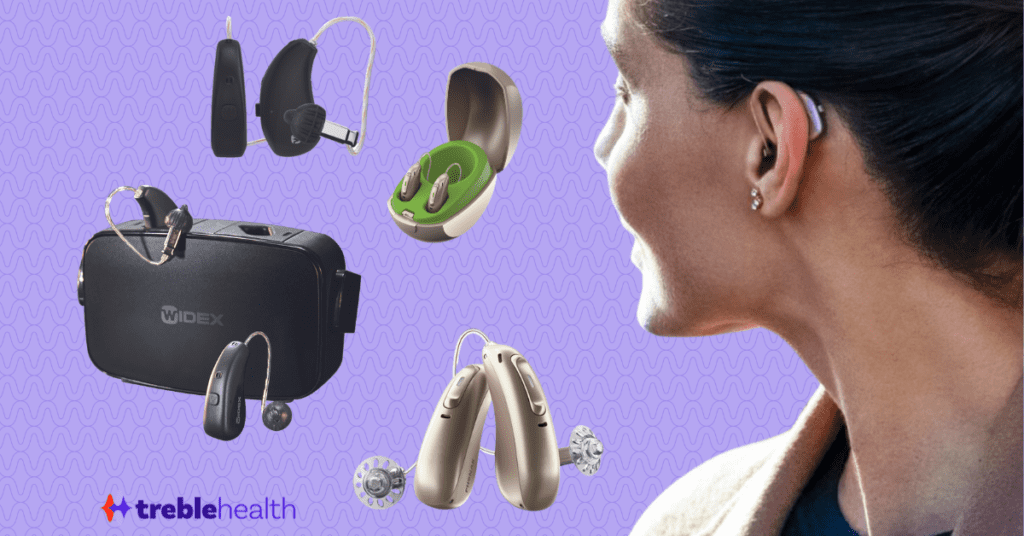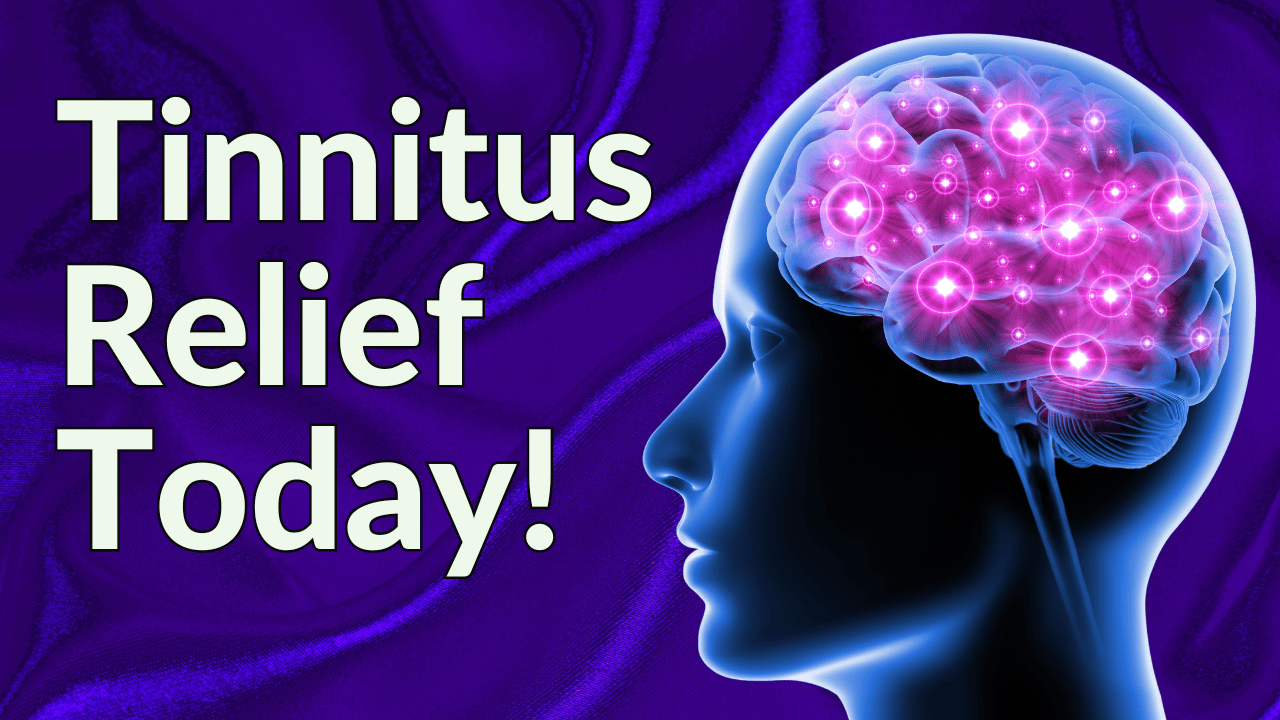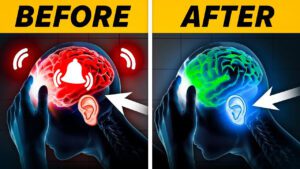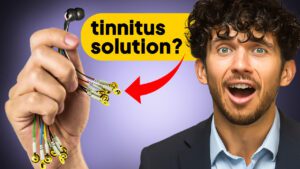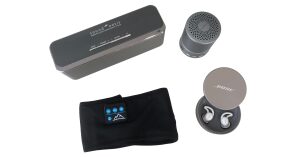If you are experiencing bothersome tinnitus, you have hopefully been offered treatments such as hearing aids, Tinnitus Retraining Therapy (TRT), Cognitive Behavioral Therapy (CBT), sound therapy, and tinnitus maskers, all to manage tinnitus symptoms and provide relief. While this is all well and good, many people seeking tinnitus relief are uncertain how to go about seeking treatment, including which are the best hearing aids to address tinnitus, or even how using hearing aids for tinnitus treatment works. We will explore the differences in these different treatment types to help you better understand which option may be best for you and the tinnitus sounds you experience.
What Causes Tinnitus?
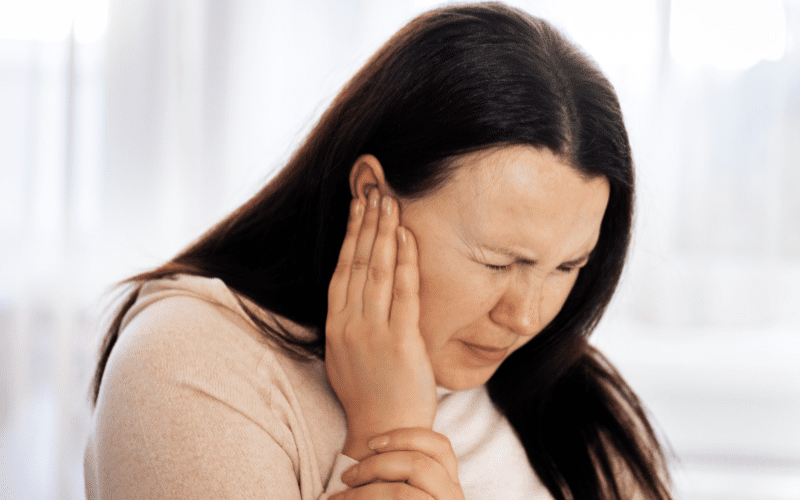

The precise cause of tinnitus remains something of a conundrum for many people, but there are several recognized sources of tinnitus onset. While hearing loss is typically considered the most likely cause, there are certainly a variety of others as well. Below, we’ve identified some of the more common reasons for tinnitus sound onset.
"Treble Health helped me reduce my tinnitus by about 80%, and now I can live my life again!"



"Treble Health helped me reduce my tinnitus by about 80%, and now I can live my life again!"
– Steve D.
Book a free consultation to learn which Treble Health solution is right for you. Join Steve and thousands more who have found lasting tinnitus relief.
- Hearing Loss. Although hearing loss is not always seen as a link to chronic tinnitus, a hearing care professional can be the first to tell you that the mechanisms behind hearing loss can lead to tonal tinnitus and other forms of the condition. Hearing loss affects tinnitus in the following ways:
- Sensorineural hearing loss. This is the most common type of hearing loss to impact tinnitus symptoms, and the most common type of hearing loss overall. It is typically caused by loud noise exposure, known as noise induced hearing loss, (which is why loud occupation workers, concert-goers, and those that are often surrounded by loud sounds, are encouraged to wear hearing protection), or age related hearing loss, known as presbycusis. A subset of this type is sudden sensorineural hearing loss, which can occur due to idiopathic causes.
- Conductive hearing loss.This type of hearing loss occurs as a result of sound transmission loss through the outer and/or middle ear. It is typically caused by conditions such as otitis externa and otitis media (the former called swimmer’s Ear, both more frequently identified as ear infections), otosclerosis, and cholesteatoma. It is usually correctable through medical or surgical intervention.
- Mixed hearing loss. Mixed hearing loss is a combination of conductive and sensorineural hearing loss, and can be caused by age related hearing loss, issues within the ear, and even a buildup of earwax.
While these are the more common causes of hearing loss, there are other potential causes, including the following:



- Head Injury/Neck Injury. Head and neck injuries have also been linked to tinnitus.
- Medications/Ototoxic Exposures. Some medication can actually harm the inner ear and other portions of the ear, which can lead to impaired hearing and other conditions like tinnitus.
- Hypertension. Hypertension can lead to tinnitus and the loss of hearing, perhaps in part due to damage to blood vessels that provide oxygen rich blood flow to the ear. In this case, medical intervention can help before turning to something like sound therapy.
- Diabetes. Diabetes causes damage to many different bodily systems, and the ears are among those systems.
- Kidney Disease. The structure of the kidneys is not terribly unlike the structure of the ears, and it has been suggested that damage to the kidneys can cause synergistic damage within the ears.
- Meniere’s Disease. Meniere’s Disease is a condition in which fluid builds up in a structure within the inner ear. It can lead to symptoms such as vertigo, nausea, hearing loss, vomiting, sweating, and tinnitus.
- Autoimmune Disorders. Autoimmune disorders attack healthy tissues and healthy bodily systems, and the ears can also be attacked in autoimmunity.
- Noise exposure, either recreationally or professionally.
No matter the precise reason for hearing loss, it is possible to develop tinnitus and require tinnitus treatment. Tinnitus can resolve when the underlying cause is addressed, and the underlying cause can help inform the type of tinnitus therapy used.
How Can Hearing Aids Help with Tinnitus Relief?
Using hearing aids for tinnitus treatment is useful, because it provides amplification in the frequency range of a patient’s hearing loss. Hearing aids for tinnitus provide relief by supporting the auditory system in three important ways.
- Hearing aids “fill the void” of missing sound created by hearing loss.
- Hearing aids help provide background noise to help reduce awareness of tinnitus symptoms. Using masking/attention effects to increase auditory stimulation and improve communication. Tinnitus hearing aids may come equipped with different programming options that standard hearing aids do not typically have to provide tinnitus relief.
- Some hearing aids provide a built in tinnitus therapy signal, which can be used simultaneously with the amplification properties of the hearing aid to provide all day tinnitus relief. Tinnitus hearing aids typically have more setting options.
Hearing Aid Sounds Work to “Fill The Void”
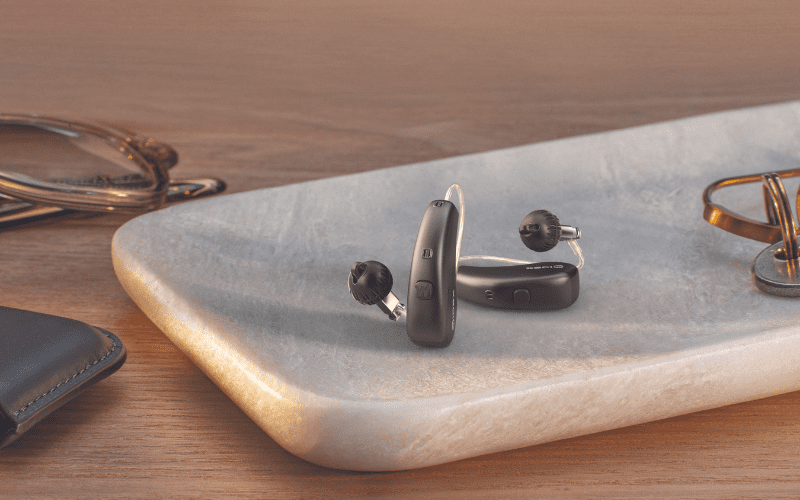

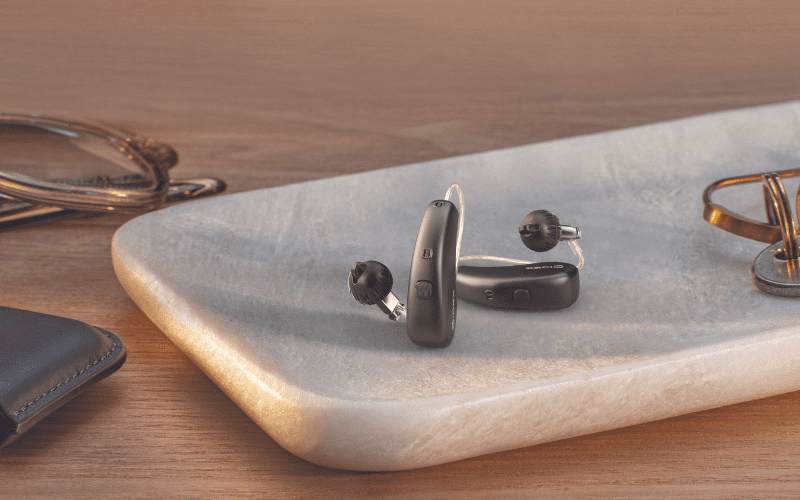
When hearing loss is present, patients experience a “sound void,” which can be addressed by using hearing aids. Audiologists use hearing aids to fill the void, and improve tinnitus symptoms. When the brain perceives a loss of auditory input, auditory neurons can misfire, which many believe to be at least partially at the root of the phantom sounds known as tinnitus. Sound voids are not unlike a phantom limb, wherein someone who has lost a limb reports still feeling sensations or pain from the lost limb.
Hearing aid management for hearing loss and tinnitus is prescriptive, meaning they are specific to the individual wearing them. Prescription aids for tinnitus use a patient’s hearing test results in order to program specific sound amplification levels. The input of auditory information is required to fill the sound void and thereby relieve symptoms. Hearing aids for tinnitus can be used for severe hearing loss, as well as moderate and mild hearing loss.
Hearing Aids: (Masking/Attentional Effects)- Auditory Stimulation and Improved Communication
One of the biggest benefits of using hearing aids for tinnitus is the improvement in hearing environmental sounds, leading to improved communication and auditory stimulation. Improving the ability to hear environmental sounds can actually provide an unintentional masking effect; the sounds of everyday life being louder can reduce tinnitus awareness. Auditory stimulation in the form of improved communication and increased awareness of environmental sounds can also help “distract” tinnitus sufferers from paying close attention to their symptoms.
How To Choose the Right Hearing Aid For Tinnitus Relief
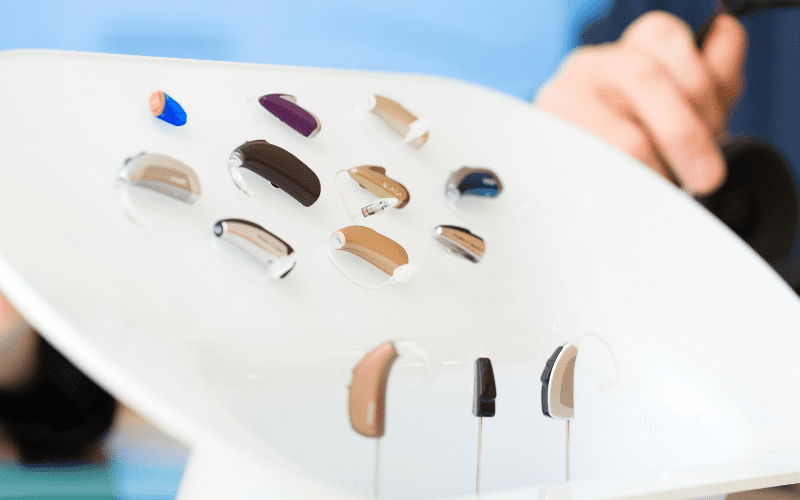

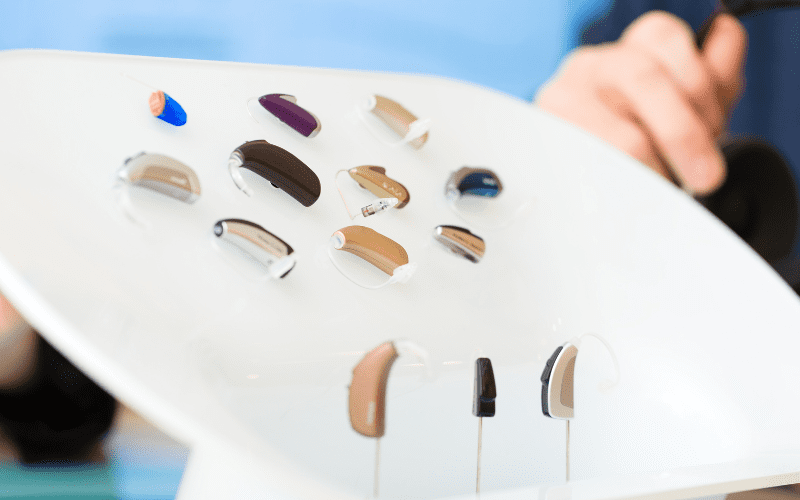
Many hearing aids provide far more than just the standard hearing aid function of amplification. Many hearing aids deliver intentional tinnitus masking sounds, but choosing which hearing aids for tinnitus to use can be difficult. Rather than selecting hearing aids for tinnitus generally, it is best to speak with a hearing professional such as an audiologist to get a specific recommendation based on your situation. A hearing professional can help you identify which hearing aids will be best for both your amplification needs, to address underlying hearing loss, as well as which brand or features are best for addressing your tinnitus. A hearing aid for tinnitus will typically provide sounds such as nature sounds, white noise, and fractal tones in order to provide tinnitus relief. At Treble Health, our favorite brands include Widex, Signia, Phonak, ReSound, and Starkey.
By combining hearing amplification and tinnitus masking sounds in hearing aids, tinnitus patients can maximize tinnitus treatment outcomes–especially when under the direction of a hearing health professional. Hearing aids for tinnitus are frequently one of the most important components of a robust, evidence-based treatment plan.
Do Insurance, Medicare, or Medicaid Cover Hearing Aids for Tinnitus?



Hearing aids can be costly, and are frequently not covered by insurance. That being said, it is important to check in with your provider and insurance carrier to determine any potential coverage for hearing aids and any therapies used to lessen tinnitus sounds.
What Is Tinnitus Masking? Is It Different From Using Hearing Aids?
Tinnitus masking (also called ‘sound therapy’) means using an external sound to reduce the perception of tinnitus. It’s important to distinguish between “fully masking,” i.e. covering the tinnitus, versus partially masking – which is the recommended approach. We don’t want to cover the tinnitus – the word masking is a misnomer in that way – we want to partially mask it, enabling long term reduction of tinnitus through a process called habituation. Masking can be provided through a variety of devices, such as tabletop sound generators, ear-level sound generators, or hearing aids. White noise, pink noise, and nature sounds can all effectively mask symptoms.
Tinnitus masking is different than using hearing aids, although hearing aids can produce tinnitus masking, though they don’t always. Tinnitus masker devices or sound generators can also produce masking noise. Masking is a technique that can be produced by different devices (tinnitus maskers, sound generators, and yes, hearing aids). If you are looking for the BEST sound therapy app, make sure to check out Treble Health’s Tinnitus Relief Web App. The app contains a variety of custom sound therapy tracks that aren’t available anywhere else, in addition to guided courses, reading materials, and more.
The Role Of Tinnitus Maskers
Tinnitus maskers (also called sound generators) are used in Tinnitus Retraining Therapy, typically with tinnitus patients with normal hearing, who either do not need amplification via hearing aids, or those with only mild tinnitus symptoms. Maskers can help the person with tinnitus achieve a neutral emotional response to tinnitus; key in habituation. Most people use them throughout the day, and they are not recommended at night – instead using a sound machine is preferred for getting relief and improved sleep.
Tinnitus Retraining Therapy (TRT)
Tinnitus maskers, also known as sound generators, are integral to Tinnitus Retraining Therapy. They are typically employed for individuals with normal hearing experiencing tinnitus, especially those who do not require hearing aid amplification or only have mild tinnitus symptoms. These maskers aid in fostering a neutral emotional response to the ringing, which is crucial for habituation. While many people utilize them during the day, it is advised to refrain from using them at night. Instead, employing a sound machine can provide relief and promote better sleep.
How We Select The Best Hearing Aids For Tinnitus Masking
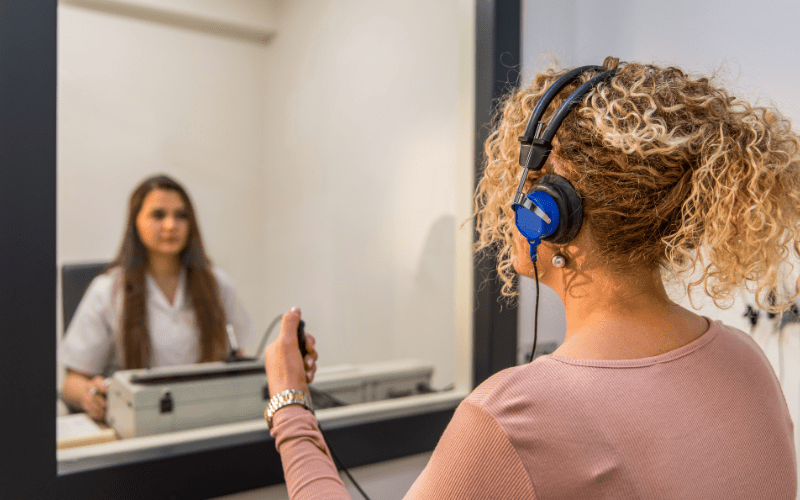

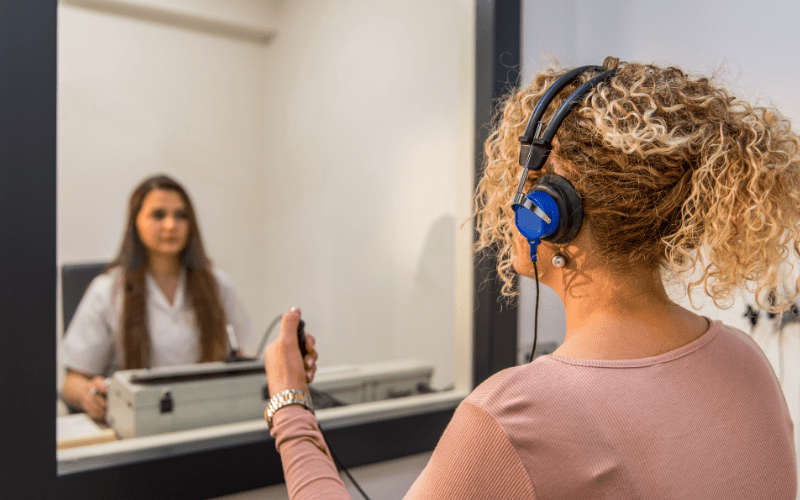
There are a plethora of hearing aids for tinnitus currently on the market, so how do we pick the right hearing aids for you and your symptoms? First, it is important to identify which hearing aid will address your hearing loss. Then, we consider what type of sound therapy or masking sound you prefer, and which hearing aids can provide that type of sound. We consider your budget, and which features would produce the maximum tinnitus reduction for your individual needs.
The bottom line? We focus on you, as the patient, and what you need to alleviate tinnitus symptoms before selecting a device or sound therapy format. Hearing aids, sound masking devices, and combination devices are all available, and our team can help you determine the treatment option that will maximize treatment benefits, reduce tinnitus symptoms, and ultimately improve quality of life. To learn more, please consider signing up for a complimentary Discovery Call with one of our audiologists where they can discuss if hearing aids are appropriate for your tinnitus, which model would be best, or if there are other better options for you.
Next Step: Book Free Consultation
- 75% of patients reduced their tinnitus within three months after following our recommendations.
- "I feel like Treble Health literally gave me my life back." - Randy S. (verified customer)
- Join thousands of people who have reduced their tinnitus after scheduling a free consultation.






